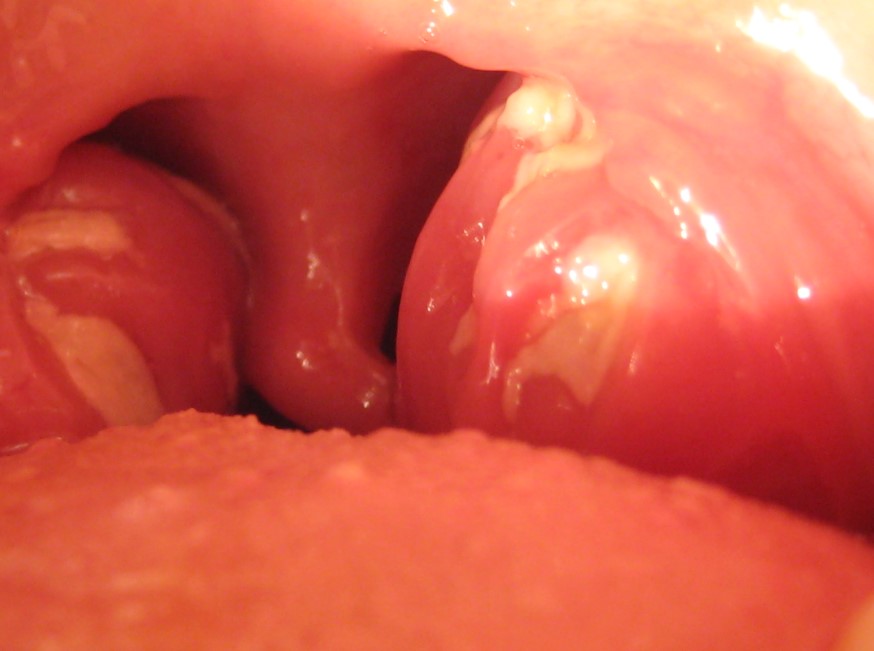Tonsillitis
Inflammation of the tonsils is referred to as tonsillitis. The condition is also called acute sore throat. It is the result of repeated infections accompanied by an enlargement of the tonsils that is referred to as chronic tonsillitis.
On each side of the throat, there are two small lymphoid organs called tonsils. Between two folds of the membrane that run up to the soft palate, they are located just behind the back of the tongue. Infected ones usually measure about the size of a lima bean, but severely infected ones can grow much larger.
Two functions are performed by these valuable organs of selective elimination. First of all, they prevent disease germs from entering the throat. Secondly, when they become sore and swollen, they serve as barometers for an infection elsewhere in the body.

Main symptoms
Tonsillitis is characterized by sore throats, fevers, headaches, and pain in various parts of the body, as well as difficulty swallowing and general weakness. When the mouth is opened widely, the tonsils appear inflamed and red.
There are many cases in which pus exudes from them. There is tenderness and swelling around the tonsillar lymph glands, which are located just behind the angle of the jaw. The ear may be painful in several cases.
Chief Causes
Tonsillitis is primarily caused by toxic conditions that are brought on by a sudden lowering of vitality resulting from exposure and sudden chills. As toxins accumulate in the body, tonsils enlarge and become inflamed when they can’t be eliminated normally through the bowels, kidneys, or skin.
A throat condition of this sort is also associated with chronic constipation, which can result in toxins that should be ejected from the system in a normal manner being reabsorbed into the bloodstream.
Treatment
Tonsillitis can be treated by painting and spraying according to the modern medical system in a harmful and suppressive way. It does not remove the toxins that are at the root of the problem. Rather than eliminating these toxins, it forces them back into the body, which may cause further problems later on.
Through proper dietary and other natural methods, the disease can be treated by cleansing the system of toxic waste. By fasting for three to five days, serious symptoms will subside within a few days. During this time, nothing but water and orange juice should be consumed.
A warm water enema should be administered daily during the fasting period to cleanse the bowels. Every two hours throughout the day, a cold pack should be applied to the throat. In this procedure, linen material is wrung out in cold water, wrapped around the throat two or three times, and covered with flannelling.
A few gargles of neat lemon juice a day will help soothe a sore throat. Severe cases can be treated with gargles made from fenugreek seeds. During a half-hour simmer in a liter of water, two tablespoonfuls of fenugreek seeds need to be cooled before using as a gargle.
You should gargle with the entire quantity throughout the day for the best results. You can also benefit from taking a hot Epsom salt bath every day or every other day. A fruit-only diet should be followed for three to four days after acute tonsillitis symptoms have passed.
A variety of fresh, juicy fruits may be consumed during this regimen, such as apples, grapefruit, grapes, oranges, pears, pineapple, peaches, and melon. There is no better medicine than pineapple juice for all types of throat afflictions. A patient can gradually transition from an all-fruit diet to a well-balanced diet after the all-fruit diet, as described below.
Breakfast – The most nutritious breakfast is fresh fruit, raw carrots, or another raw salad, along with milk. Alternatively, you can add dried fruits, such as prunes.
Lunch – Served with whole wheat chapattis and steamed vegetables as available. It is especially beneficial to consume bitter gourd and fenugreek vegetables.
Dinner – The salad should be made up of vegetables as available sprout seeds, such as alfalfa seeds and mung beans, as well as wholemeal bread, butter, or cottage cheese. Tonsillitis can also be treated with raw vegetable juices.
The juices of carrots, beets, and cucumbers are especially beneficial when taken individually or in combination. A formula proportion of 300 ml of carrot, 100 ml of beet, and 100 ml of cucumber was found to be effective when used together. A daily health regimen should include dry friction, hip baths, breathing exercises, and other exercises. It is also beneficial to take a hot Epsom salt bath once or twice a week.
The natural methods outlined above can be successfully used to treat tonsillitis. It is only necessary to remove tonsils when they are severely diseased, rugged, and contain hopelessly incurable pus pockets when surgery is needed.







